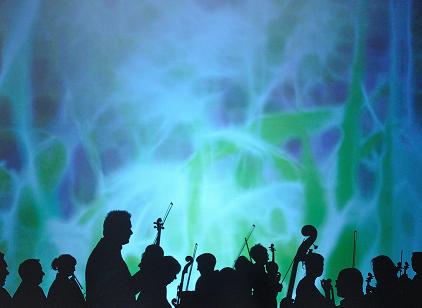|
At the very beginning
of his artistic path Robert Kabara met two of
the greatest polish violin players: professor
Eugenia Umińska and her successor professor Kaja
Danczowska. Both artists’ high standard was
based on the Polish canon of violin school,
however, it was not free from foreign
influences. During her studies in Paris in the
1920’s, Eugenia Umińska’s mentor was George
Enescu, while Kaja Danczowska developed her
mastership skills cooperating with David
Oistrakh in the Moscow Conservatory.
Still being a student, had already begun
his intense concert activity. He was the
laureate of the most prestigious national and
international competitions, such as in Łódź
(1983), Poznań (1985) or the semifinals of the
Paganini Competition in Genoa (1983). His
crowning achievement was winning third prize
along with nine non-statutory awards at the 9th
International Henryk Wieniawski Violin
Competition (1986). One of the reviewers,
Kazimierz Wiłkomirski, commented that “ (…)
Robert Kabara is an artistic prodigy of the
greatest value. In his impetuous, dynamic,
almost enchanting interpretation …truly great
music could be heard.”
This success was followed by such achievements
as winning first prize at the Adelaide
International Violin Music Competition in 1986,
and a special distinction at the Zino
Francescati Compettion in Marseille, in1989.
He was taught by the best: Oleg Krysa and
Grigori Zhyslin, as well as Andre Gertler and
Wolfgang Marschner. Their distinctive styles led
to a clash between the classic virtuosity of the
elegant and deeply emotional Leopold Auer’s
Russian school of violin and the measured
intellectual Western European way. The variety
of Kabara’s musical influences helped him
broaden his solo repertoire and give more
refined performances. Robert Kabara continues
his concert activity in Polish and European
concert halls. He is known for his chamber music
performances during Munich, Oberhausen and Tokyo
music festivals, as well as in La Scala Opera
House in Milan or Teatro Collon in Buenos Aires.
Since 2009, he has been realizing his own
project “La Musica da Camera” at the
Jagiellonian University.
One of the crucial moments in Kabara’s
career was the creation of Sinfonietta Cracovia,
which emerged from an initiative of young
musicians from the Music Academy in Krakow.
Thanks to Kabara’s artistic leadership, the
orchestra has transformed into an ensemble
renowned in Europe. Apart from being the leader
of Sinfonietta Cracovia, he has made several
recordings with the orchestra: from Penderecki’s
„Sinfonietta per archi’, produced by PWM
Edition, to Lutosławski’s chamber music recorded
for Arion Studios from France.
As a soloist, Kabara is the author of a
vast discography comprising of studio albums, TV
and radio recordings. He recorded Panufnik’s
compositions (Dux), Henryk Wieniawski’s “Violin
Concerto no. 1” (Arte TV), Penderecki’s “Violin
Concerto no. 1 under the composer’s baton and
Vivaldi’s “The Four Seasons” (Dux), awarded
first prize “Fryderyk” by the Polish Society of
the Phonographic Industry in 1998.
The performances as a soloist are by far
the most interesting part of his musical life.
Robert Kabara always cooperates with the
greatest Polish conductors: Gabriel Chmura,
Jacek Kaspszyk, Jerzy Maksymiuk and Antoni Wit.
He has performed with such prominent artists as
Krzysztof Penderecki, under whose direction he
played Maestro’s “Violin Concerto No. 1” and
“Metamorphoses” (“Violin Concerto No. 2”), along
with Szymanowski’s (with the Symphony Orchestra
in Trondheim) and Panufnik’s (with the Orchestra
do Norte in Porto) concertos. He has also
collaborated with Maxim Vengerov, who conducted
Mozart’s D major during Kabara’s solo
performance, and formed duo with such master as
Grigori Zhyslin. Robert Kabara’s repertoire
ranges from Baroque music and Beethoven to
violin concertos from the 19th and 20th century,
especially those created by Polish and foreign
composers, from Prokofiev and Bernstein to
Penderecki.

|

